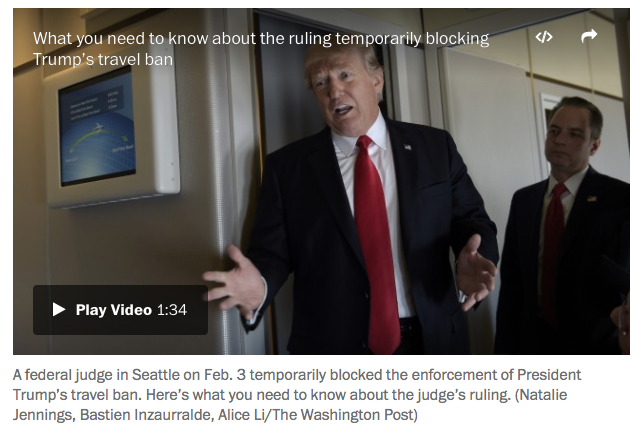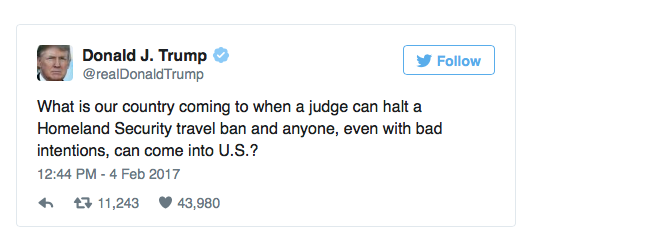President Trump on Saturday morning ripped into a federal judge’s decision to temporarily block enforcement of his controversial travel ban.
“When a country is no longer able to say who can, and who cannot , come in & out, especially for reasons of safety &.security — big trouble!” Trump posted on Twitter. CLICK IMAGE for video: 
He also appeared to question the legitimacy of the federal judge who issued the ruling.
“The opinion of this so-called judge, which essentially takes law-enforcement away from our country, is ridiculous and will be overturned!” Trump tweeted. 
The tweets came hours after a federal judge in Washington state temporarily blocked enforcement of Trump’s ban on entry to the United States.
U.S. District Judge James L. Robart wrote in his opinion that “fundamental” to the court’s work was “a vigilant recognition that it is but one of three equal branches of our federal government.”
Robart, a judge appointed by George W. Bush, said in his written order that U.S. officials should stop enforcing the key aspects of the ban: the halting of entry by refugees and citizens from certain countries. He did not specifically address the matter of those whose visas already had been revoked.
Following the Friday-night ruling, government authorities immediately began communicating with airlines and taking steps that would allow travel by those previously barred from doing so, according to a U.S. official.
At the same time, though, the White House said in a statement that the Justice Department would “at the earliest possible time” file for an emergency stay of the “outrageous” ruling from the judge. Minutes later, it issued a similar statement omitting the word “outrageous.”
[Fact Checker: The number of people affected by Trump’s travel ban: About 90,000]
“The president’s order is intended to protect the homeland and he has the constitutional authority and responsibility to protect the American people,” the White House said.
Trump signed orders on Jan. 27 not only to suspend admission of all refugees into the United States for 120 days but also to implement “new vetting measures” to screen out “radical Islamic terrorists.” Refugee entry from Syria, however, would be suspended indefinitely, and all travel from Syria and six other nations — Iran, Iraq, Libya, Somalia, Sudan and Yemen — is suspended for 90 days. Trump also said he would give priority to Christian refugees over those of other religions, according to the Christian Broadcasting Network.
Hours after it was signed, Trump’s executive order sparked massive protests at airports across the country, as reports surfaced that dozens of travelers from the affected countries, including green-card holders, were being detained.
The American Civil Liberties Union filed a lawsuit the following day challenging Trump’s order after two Iraqi men with immigrant visas were barred from entering the United States at New York’s John F. Kennedy International Airport. Within hours, federal judge Ann M. Donnelly issued a stay to stop the deportations nationwide, noting there was a strong likelihood the order had violated the petitioners’ rights to due process and equal protection by the Constitution.
[Justice Dept. lawyer says 100,000 visas revoked under travel ban; State Dept. says about 60,000]
Since then, the travel ban has evolved as Trump’s administration has attempted to clarify exceptions to the order. The Department of Homeland Security said the ban would not apply to permanent residents or green-card holders, dual citizens who carry a passport from somewhere other than one of the banned countries and those with NATO or U.N. visas.
Robart’s ruling Friday, which was broader than similar ones before it, sets up a high-stakes legal confrontation between the new president and the judicial branch.
The ruling is temporary, and the ultimate question of whether Trump’s executive order will pass constitutional muster will fall to higher-level courts. Legal analysts have said the ban could be difficult to permanently undo because the president has broad authority to set immigration policy.
Later Saturday morning, the State Department announced it would reverse its visa revocations, allowing previously banned travelers to enter the United States.
Trump, presumably responding to the latest development, resumed tweeting his displeasure hours later. 
Though his tweet implied that “anyone” could now come into the United States, the State Department’s announcement applied to travelers from those countries who already held valid visas.
“Those individuals with visas that were not physically canceled may now travel if the visa is otherwise valid,” a State Department spokesman said Saturday, adding that Department of Homeland Security personnel “will resume inspection of travelers in accordance with standard policy and procedure.”
Matt Zapotosky, Lori Aratani and Justin Jouvenal contributed to this article. This post has been updated.
Read more:
Former Norwegian prime minister detained at Dulles Airport for an hour. He visited Iran in 2014.
Trump asked for a ‘Muslim ban,’ Giuliani says — and ordered a commission to do it ‘legally’
Trump administration attempts to clarify exceptions to travel ban


You must be logged in to post a comment Login